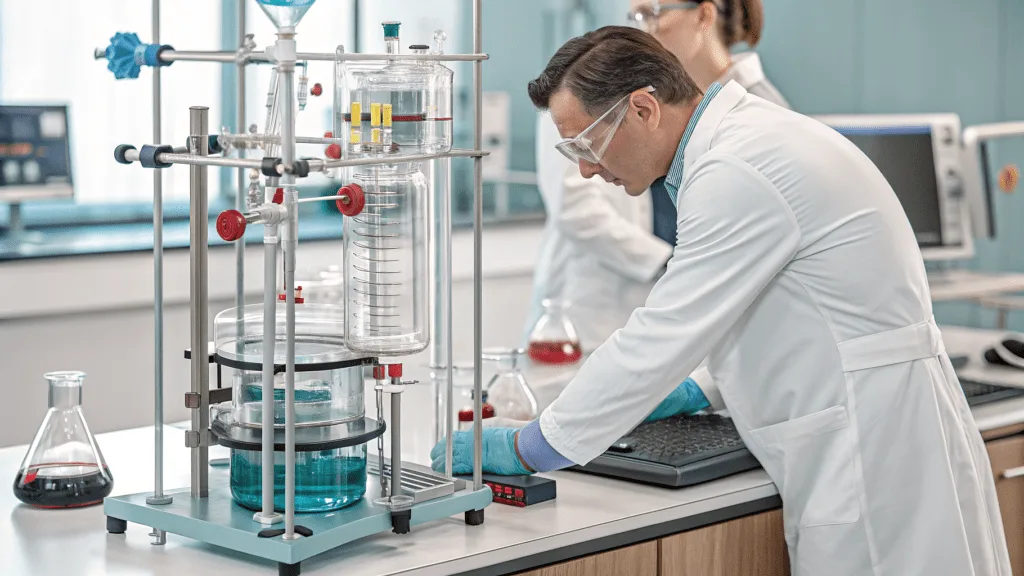Laboratory reactors are critical components in chemical synthesis, pharmaceutical research, and industrial applications, offering precise control over reaction conditions such as temperature, pressure, mixing, and light exposure. These reactors enable researchers to perform experiments under reproducible and scalable conditions, ensuring accurate and reliable results.
At Apex Scientific, we supply a variety of laboratory reactors tailored to different application needs. Whether you’re looking for glass reactors, high-pressure reactors, or photochemical reactors, we provide the right solution for your research requirements. This guide will help you understand the key factors to consider when selecting the ideal laboratory reactor for your laboratory.
Types of Laboratory Reactors and Their Applications
1. Glass Reactors
Glass reactors are popular in research and development laboratories due to their transparent design, which allows for easy monitoring of reactions. These reactors offer excellent chemical resistance, making them suitable for a variety of processes such as chemical synthesis, crystallization, and polymerization.
Our range of glass reactors includes:
Benchtop Glass Reactors
- Perfect for small-scale reactions and R&D laboratories.
- Available in volumes ranging from 500 mL to 5 L.
- Ideal for chemical synthesis and crystallization.
EZ Chem Pilot Plant Reactor
- Designed for medium-scale production and pilot studies.
- Available in capacities from 5 L to 50 L.
- Enhances scalability for process optimization.
Plus Chem Pilot Plant Reactor
- Engineered for industrial-scale production.
- Offers robust mixing and temperature control for complex chemical processes.
Parallel Reaction Stations
- Allow simultaneous reactions under different conditions.
- Useful for high-throughput screening and reaction optimization.
Applications of Glass Reactors
- Chemical synthesis and process development
- Pharmaceutical formulation and crystallization studies
- Materials science research, including polymerization and nanoparticle synthesis
2. High-Pressure Reactors
High-pressure reactors are designed for processes requiring elevated pressures and temperatures, such as hydrogenation, polymerization, and catalytic reactions. Constructed from stainless steel or other high-strength materials, these reactors withstand extreme conditions to ensure reliable performance.
Our high-pressure reactor range includes:
BR Series High-Pressure Reactors
- Available in various sizes and pressure ratings.
- Designed for research and industrial applications requiring pressures up to 200 bar.
- Provides precise temperature and pressure control for consistent results.
CR Series High-Pressure Reactors
- Perfect for catalytic reactions and polymerization under extreme conditions.
- Suitable for advanced materials research, with capabilities to handle higher pressure levels.
Applications of High-Pressure Reactors
- Hydrogenation and catalytic reactions
- Supercritical fluid extraction
- Polymerization processes
3. Photochemical Reactors
Photochemical reactors are specifically designed for reactions that require controlled exposure to UV or visible light. These reactors are essential for research in photocatalysis, photopolymerization, and environmental chemistry.
Key Features of Photochemical Reactors
- Equipped with specialized light sources for specific wavelengths
- Designed for homogeneous and heterogeneous photocatalysis
- Available in various reactor sizes to suit different scales of research
Applications of Photochemical Reactors
- Photocatalysis for environmental applications (e.g., water purification)
- Development of new materials and coatings
- Light-induced polymerization and organic synthesis
Key Factors to Consider When Choosing a Laboratory Reactor
When selecting the right laboratory reactor for your application, consider the following factors:
- Reaction Volume – Match the reactor size to your batch size requirements, whether it’s a small benchtop system or a large pilot plant reactor.
- Temperature and Pressure Requirements – Ensure the reactor can handle your application’s temperature and pressure needs, whether it’s ambient conditions (glass reactors) or high-pressure operations (high-pressure reactors).
- Chemical Compatibility – Choose reactors made from materials resistant to your chemicals and solvents (e.g., borosilicate glass for chemical resistance, stainless steel for high-pressure applications).
- Mixing and Stirring Capabilities – Effective agitation is essential for uniform reaction conditions. Reactors offer mechanical, magnetic, or overhead stirring options.
- Scalability – Consider how easily the reactor system can transition from lab-scale to pilot plant production if scaling up is part of your process.
- Special Requirements – Applications such as photochemistry or catalytic reactions require specific reactor designs (e.g., photochemical reactors with UV light sources).
Optional Accessories and Upgrades
Many reactors can be customized with accessories to improve performance:
- Reflux condensers – Useful for distillation applications.
- Jacketed reactors – Provide precise temperature control using a circulating bath.
- Pressure gauges and safety valves – Essential for high-pressure reactors.
- Advanced control systems – Enable automated temperature and pressure regulation for optimal results.
Conclusion
Selecting the ideal laboratory reactor involves considering various factors, such as reaction type, process conditions, and scalability. At Apex Scientific, we offer a broad selection of glass reactors, high-pressure reactors, and photochemical reactors manufactured by Wiggens to meet your research and production needs.




